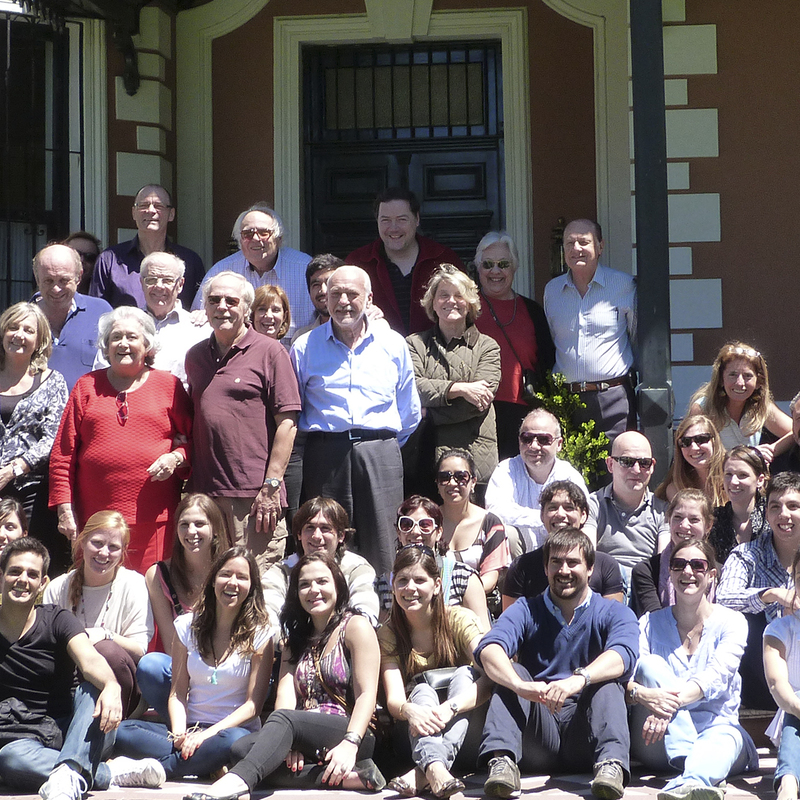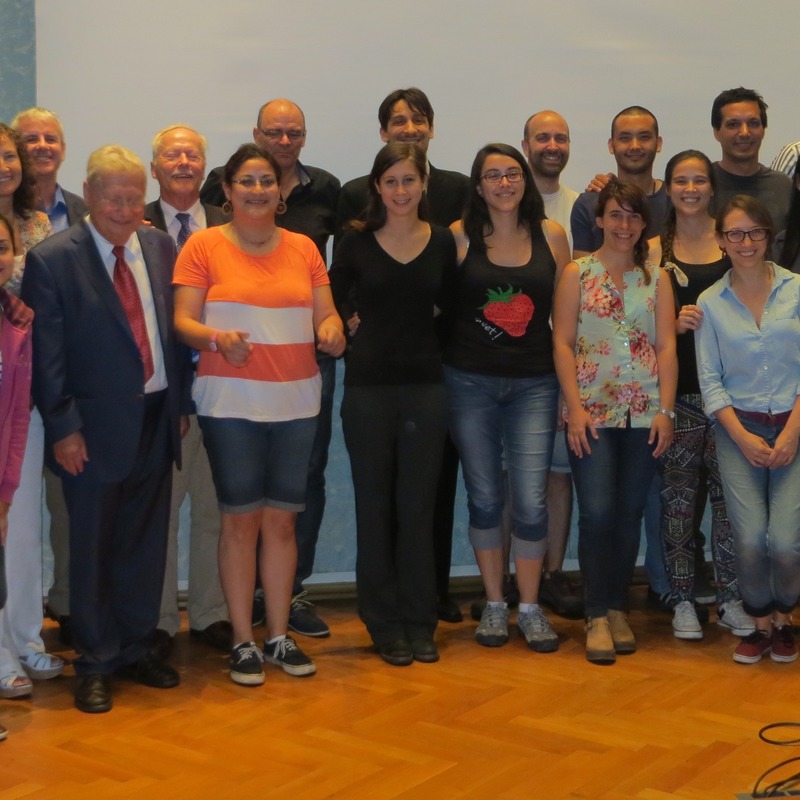Search
International Congress of Translational Medicine- Announcement: Buenos Aires, Argentina, Nov 24-25, 2015
DOI: 10.17160/josha.2.6.60
The Faculty of Pharmacy and Biochemistry (Facultad de Farmacia y Bioquímica) of the Universidad de Buenos Aires (UBA) hosts the second International Congress of Translational Medicine on November 24th and 25th . The event will be under the auspices of the German and Swiss Embassies in Buenos Aires. The International Congress will be held in the context of the International Master Program in Biomedical Sciences (IMBS) Cooperation, a German-Argentine Study Program at the Universities Freiburg and Buenos Aires which is currently being extended to the University of Montevideo, Uruguay. The Program was launched in 2008 and has already paved the way for many students who joined academic and professional careers after completing the Master Program. A broad range of topics in the fields of Molecular Biology and Medicine as well as Microsystems and Bioethics will be covered by the two day congress and communicated in oral and poster presentations. Dr.
IMBS Class 2016-18: Inscription Open
DOI: 10.17160/josha.2.6.59
In 2008 the International Master in Biomedical Sciences (IMBS) was established as a joint program between the Faculty of Medicine of the Albert Ludwigs University of Freiburg (ALU) and the Faculties of Medicine and Pharmacy and Biochemistry of the University of Buenos Aires (UBA) in Argentina. The aim of this program is to provide scientific knowledge and state-of-the-art experimental experience to current and emerging biomedical research areas with a focus on translational research and development. It is also meant to foster teaching and research cooperation between the two Universities and to contribute to cultural exchange on the master, PhD and professor level. The program was implemented in a specific agreement co-signed by the Rectors of the two Universities in 2008. Moreover, the cooperation was strengthened by the UBA visit of the Minister President of Baden-Württemberg Kretschmann in 2011 when another agreement was signed.
JOSHA - Table of Contents Volume 2 Issue 5
DOI: 10.17160/josha.2.5.58
We heartily welcome our readers to the new Issue 5 of Volume 2 in which we present the first part of the talks from the Bioethics Symposium “Science, Ethics and Society” which took place on 14th of August in Freiburg. Our special Issue guest is Florencia Luna, a bioethicist and researcher at CONICET (National Research Council Argentina) and FLACSO (Latin American Faculty of Social Sciences), Argentina, who addresses the topic of assisted reproductive technologies and points out some particular challenges of the technology in her talk “To say or not to say?”. A further special contribution to the Symposium and this Issue is the talk “Ethics in Epidemics and Disasters: Rights and Obligations of Healthcare Workers” by Andreas Reis from the World Health Organization, Geneva, Switzerland.
Research Ethics in Epidemics and Public Health Emergencies
DOI: 10.17160/josha.2.5.56
Responses to epidemics, emergencies and disasters raise many ethical issues for the people involved, who include responders, public health specialists and policy-makers. This workshop provides an ethical view point on issues arising when research studies are conducted in these difficult contexts. In particular, it will be focused on adaptations of ethical oversight and processes, as deliberations of research ethics committees. Using the example of the recent Ebola outbreak in West Africa, the participants of the workshop will discuss ethical issues within a concrete case study. I would like to express my gratitude to Dr. Andreas Reis, WHO, and Dr. Ignacio Mastroleo, Universidad de Buenos Aires, for their continued support.
Ethical Legal and Social Issues (ELSI) in Assisted Reproduction Technologies (ART)
DOI: 10.17160/josha.2.5.55
Florencia Luna received an M.A. from the University of Columbia (USA) and a Ph.D in philosophy from the University of Buenos Aires. She directs the Program of Bioethics and is teaching bioethics at FLACSO (Latin American University of Social Sciences). She is Principal Researcher at CONICET (National Scientific and Technological Research Council). She has been the President of the International Association of Bioethics (IAB) during 2003 to 2005. She is Temporary Advisor of the World Health Organization (WHO) since 1997 and is now Expert for WHO since 2009. She has been appointed to the Scientific and Technical Advisory Committee (STAC) of Tropical Disease Research (TDR) at WHO. Beginning in 2005, she became a member or the Steering Committee of the Global Forum on Bioethics in Research (GFBR). She is co- PI with Ruth Macklin of a research training grant of the Fogarty International Centre, NIH (National Institutes of Health- (US)) to train persons in ethics and research (2000-2016).
To say or not to say? Assisted reproductive technologies : Some challenges
DOI: 10.17160/josha.2.5.54
Florencia Luna received an M.A. from the University of Columbia (USA) and a Ph.D in philosophy from the University of Buenos Aires. She directs the Program of Bioethics and is teaching bioethics at FLACSO (Latin American University of Social Sciences). She is Principal Researcher at CONICET (National Scientific and Technological Research Council). She has been the President of the International Association of Bioethics (IAB) during 2003 to 2005. She has won the Guggenheim Foundation Fellow (2006) and has been awarded the Konnex Prize: Honor Diploma in Ethics in 2006, in recognition of important figures in Humanities during the last decade in Argentina (1996-2006). She is Temporary Advisor of the World Health Organization (WHO) since 1997 and is now Expert for WHO since 2009. She has been appointed to the Scientific and Technical Advisory Committee (STAC) of Tropical Disease Research (TDR) at WHO.
Ethics in Epidemics and Disasters: Rights & Obligations of Healthcare Workers
DOI: 10.17160/josha.2.5.53
Andreas Alois Reis (MD, MSc) is a Technical Officer in the Global Health Ethics Unit of the Department of Knowledge, Ethics, and Research at WHO in Geneva, Switzerland. After medical studies and practice in internal medicine in Germany, France and Chile he pursued studies in health economics and ethics. His main area of work is public health ethics, with a focus on distributive justice and equitable access to health services, and ethical aspects of infectious diseases such as HIV, pandemic influenza, and tuberculosis. He has published widely, lectured and organized trainings for WHO in more than 40 countries, and is serving on the editorial boards of Public Health Ethics and Monash Bioethics Review. In this presentation Dr. Reis discusses important ethical aspects of the deployment of Health Care Workers in areas of epidemics and disasters.
Minimum Labour Standards in a Globalized Economy
DOI: 10.17160/josha.2.5.51
The recent financial and economic crisis has put a big question mark behind the neo-liberal paradigm. For a long time the prevailing approach was deregulation, leaving everything to the market. At least as far as financial markets are concerned, there seems to be a change of perception. The change of paradigm should not be confined to the financial market. It also should be applied to labour markets. Even if many long-term benefits are indirect and difficult to measure, empirical evidence shows that labour standards result in improved health and human capital which increases the productivity potential of workers. It particularly shows that fair working conditions result in improved motivation and willingness of workers for high performance. Long-term and stable relationship between the worker and the company provides incentives to companies to invest in training of their workers because the company is able to recover returns from training.
JOSHA - Table of Contents Volume 2 Issue 4
DOI: 10.17160/josha.2.4.50
Table of Contents
JOSHA – A World of Reading
DOI: 10.17160/josha.2.4.48
Seven contributions to JOSHA’s new Issue 4 of Volume 2 lead you from a biochemical method to experimental oncology, further to digital acrylics, academic appointment procedures and ethics, and finally to an invitation to participate in a workshop and a symposium on bioethics. Together with the first four issues since its initiation, JOSHA continues to provide an expanded range of rich material and new information. As outlined in the Editorial to the first issue, JOSHA has been initiated exactly for this goal, to create a novel open access internet platform to facilitate entrée to the broad diversity of important discoveries and creativity in the fields of Science, Humanities and Arts. JOSHA’s new issue will again sustain this conception. We are confident that it will have impact on the diversity and the colorfulness of your world of reading. Let yourself seduce to read articles that are not primarily in the center of your concern.


.jpg?1474209995)



.jpg?1454055336)

.jpg?1474210026)
